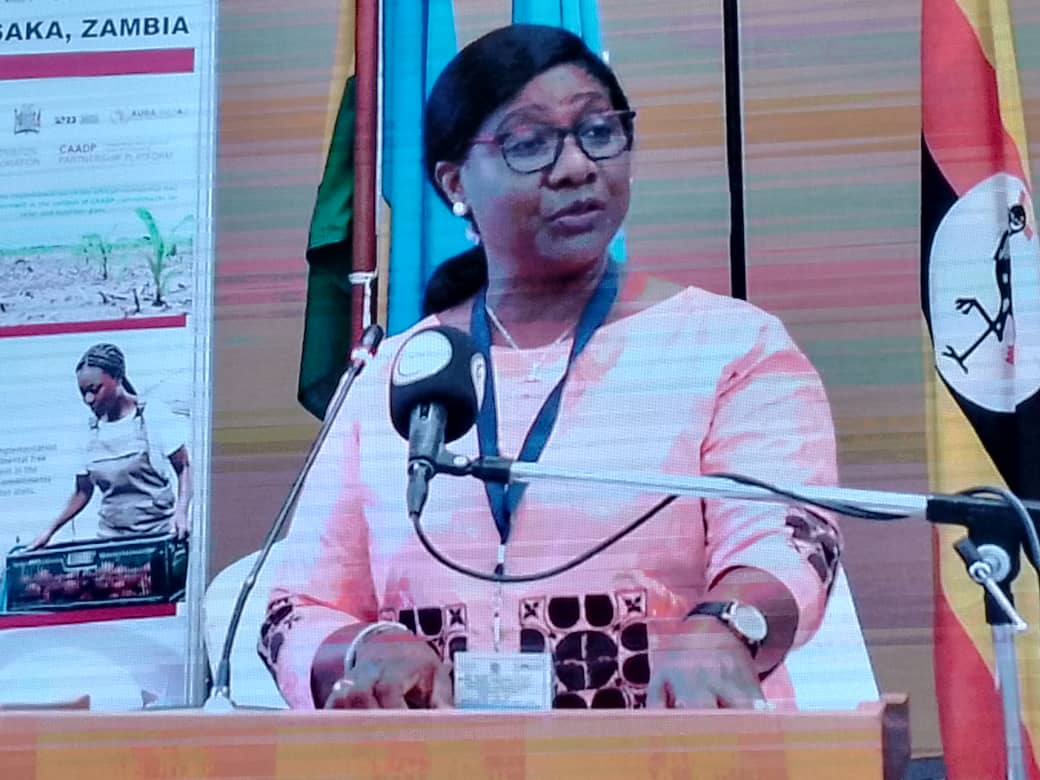|
Getting your Trinity Audio player ready...
|
Parliamentarians play an important role in effectively lobbying towards the achievement of the Malabo targets, Hon. Dr. John Kanyuithia Mutunga, MP for Tigania West Constituency, and Chairman of the Agriculture and Livestock Committee of the Kenyan National Assembly has said.
He made the remarks during a plenary session to commemorate the 14th Africa Day for Food and Nutrition Security (ADFNS) and the 19th Comprehensive African Agriculture Development Programme (CAADP) Partnership Platform today in Lusaka, Zambia.
“We are hoping to launch today the African Food Systems Parliamentary Network to bring legislators in tandem with the rest of the development actors so as to effectively represent them. When Parliamentarians know, they speak the facts as they are. An ignorant lot of parliamentarians will enact policies, and legal and regulatory instruments that do not reflect reality.
“The network will therefore enable some integration of the much-needed legislation for effective agriculture. When parliamentarians speak, the government listens. It is better to have them well-versed in facts so that they may effectively lobby towards the achievement of the Malabo targets,” Hon Mutunga said.
The legislator said Kenya is making significant strides in fulfilling the Malabo targets. There is a progressive increase in budgetary allocation to agriculture to support value chain development and inclusivity in agriculture. More women and youth are targeted for value chain development support for empowerment and job creation. For instance, Kenya is progressively embracing digital solutions in various sectors, agric included.
Kenya conducted nationwide farmer profiling and registration using digital solutions to know and locate farmers for better targeting, planning, monitoring, and evaluation of the program and its impacts. To date, 6.3 Million farmers have been registered.
There is an increase in climate action for sustainable agricultural production options as well as increased financing towards water harvesting structures to avail water for expansion of area under irrigation.
“We have adopted appropriate fertilizer blends to improve soil health. Soil health improvement and management are key to increased productivity The Fertilizer Subsidy Program accounts for 60% of the total fertilizer requirement. The increased use of mobile telephone technology to reach farmers directly has reduced delivery costs through the reduction of middle-level handling, which has in effect reduced the temptation to employ irregular practices, making it easier for private sector uptake.
Seed quality improvement and production of drought-tolerant seeds are opening up more area under crops. Harmonization of standards and negotiating common external tariffs will boost inter-regional trade. The Kenyan Parliament has embarked on systematic legislative reforms towards reduced production costs for better market access (The Tea Act, Coffee and Sugar Bills)
Honorable Mr. Melese Mena Gemeso, from Ethiopia Parliament who is responsible for the agriculture standing committee said agriculture in Ethiopia is the backbone of the economy.
In Ethiopia, agriculture is responsible for food security to feed 120 million citizens. It enhances exports, substitutes imports, supplies raw materials for agro-industry parks and creates jobs for youth and women.
“Based on the Malabo Declaration and Comprehensive Africa Agriculture Development Programme commitments, Ethiopia allocated a 10% budget from the government treasury for the agriculture sector. We met the target. We did policy revision according to the situation. Among the revisions, there is no tax for farmers and pastoralists to import tractors, combiners, and water pumps for the purpose of irrigation.
“To enhance climate change resilience to high-level attention for green legacy, in the last four years, we planted 25 billion seedlings and supported our neighboring countries by providing seedlings to plant and we practically saw our commitment to collaboration,” he said.
Mrs Estherine Lisinge-Fotabong Director of Agriculture, Food Security and Environmental Sustainability at AUDA-NEPAD said intra-African exports stand at just about 25% of Africa’s total exports, a number that pales in comparison to regions like Southeast Asia.
She said this calls for heightened collaboration among governments, regional bodies, and private sectors to revolutionize trade and ensure healthier diets for citizens.
“The AfCFTA offers a historic prospect for Africa to bolster its economies, enhancing trade and development. It dovetails seamlessly with the CAADP framework, which envisions hunger and food insecurity eradication. However, the path forward is fraught with challenges. Our continent, despite its vast resources, grapples with the triple burden of malnutrition, affecting our present and future generations.
“We must adapt our approach to this challenge. This includes creating a conducive political environment, ensuring cross-sectoral alignment in policies related to nutrition, and delivering targeted nutrition interventions effectively. AUDA-NEPAD’s Nutrition and Food Systems Strategic Programme champions this holistic strategy. Africa’s agricultural landscape is diverse and rich, yet, despite progress, it still grapples with challenges, especially when you consider that agriculture employs 65% of our workforce. Although agriculture remains a mainstay for the majority of Africa’s workforce, its growth is yet to match the ambitions of eradicating hunger and malnutrition,” she said.






